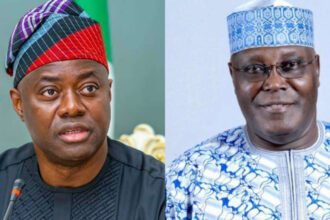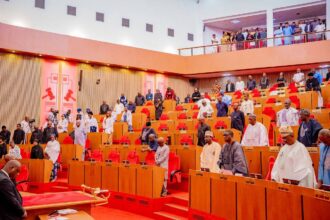
A fresh wave of political reactions has trailed President Bola Ahmed Tinubu’s appointment of Professor Joash Amupitan, SAN, as the new Chairman of the Independent National Electoral Commission (INEC), following revelations that the respected law professor once served as lead counsel for the All Progressives Congress (APC) and President Tinubu during the fiercely contested 2023 presidential election tribunal.
The appointment, announced on Tuesday, has ignited a storm of debate about neutrality, conflict of interest, and the integrity of Nigeria’s electoral umpire, especially given Amupitan’s prominent role in defending the very government he is now expected to regulate.
According to official court documents and legal records, Prof. Joash Amupitan was among the 50 Senior Advocates of Nigeria (SANs) engaged by President Tinubu and the APC to defend the outcome of the February 25, 2023 presidential election, which was challenged by opposition candidates Atiku Abubakar of the Peoples Democratic Party (PDP) and Peter Obi of the Labour Party (LP).
The legal team was led by eminent constitutional lawyer Chief Wole Olanipekun, SAN, one of Nigeria’s foremost legal luminaries, and included other high-profile figures such as Lateef Fagbemi, SAN (now Attorney-General of the Federation and Minister of Justice), Ahmad El-Marzuq (then APC National Legal Adviser), Taiwo Osipitan, SAN, Babatunde Ogala, SAN, Gordy Uche, SAN, Adeniyi Akintola, SAN, Kemi Pinheiro, SAN, and H.M. Liman, SAN, among others.
Within that formidable lineup, Prof. Amupitan played a central role as one of the coordinating counsels, responsible for key legal arguments and strategic submissions defending the validity of Tinubu’s election victory. The Presidential Election Petition Court (PEPC), in a unanimous 4-0 judgment delivered on September 6, 2023, ultimately dismissed all petitions by the opposition parties, thereby affirming Tinubu’s victory.
Professor Joash Amupitan, a distinguished law professor at the University of Jos, is widely respected in academic and legal circles for his expertise in constitutional law, jurisprudence, and human rights. He was elevated to the rank of Senior Advocate of Nigeria (SAN) in recognition of his professional excellence and contributions to legal scholarship.
However, his involvement in partisan litigation for the APC and Tinubu has now come under scrutiny, as critics argue that his previous role creates a potential conflict of interest with his new position as head of the nation’s electoral commission.
Under Nigerian law, the INEC Chairman is required to be politically neutral and must not engage in partisan politics. Section 154 of the 1999 Constitution (as amended) mandates that the appointment of the INEC Chairman should inspire public confidence and independence of the Commission.
Political observers and civil society organizations have raised questions about whether someone who previously served as a lead counsel for a sitting president’s political party can now fairly oversee elections involving the same party.
Both the PDP and the Labour Party have expressed serious reservations about the appointment, describing it as a “direct assault on electoral neutrality.”
A senior PDP official who spoke on condition of anonymity said:
“This appointment makes a mockery of democracy. How can someone who defended the APC and Tinubu’s mandate now preside over elections where the same party will participate? It is like making a referee out of the team’s lawyer.”
Similarly, the Labour Party issued a statement through its National Publicity Secretary, arguing that the appointment was a reward for political loyalty rather than merit, and called on the Senate to reject Amupitan’s confirmation if due process requires legislative approval.
“While we respect Professor Amupitan’s academic credentials, Nigerians must see this for what it is — the consolidation of partisan control over the electoral body. It is dangerous for democracy,” the statement read.
Defending the choice, a senior aide to President Tinubu told [Newspaper Name] that the appointment was based purely on competence, experience, and integrity, not political affiliation.
“Professor Amupitan is a man of impeccable character and intellectual depth. His work as a legal practitioner, including the 2023 tribunal, was professional, not political. Every lawyer is entitled to take briefs — it does not translate to partisanship,” the aide stated.
He added that Amupitan’s track record as an academic, reform advocate, and constitutional scholar made him “eminently qualified” to lead the electoral commission through a period of technological transformation and legal reform.
“This administration is focused on strengthening institutions, not controlling them,” he said.
The appointment has stirred sharp divisions across the public sphere. Some Nigerians on social media have called it “a conflict of interest appointment”, while others argue that legal representation does not imply political bias.
Human rights lawyer Femi Falana, SAN, in a televised interview, described the controversy as “understandable but not conclusive.”
“We must separate professional duty from political alignment. Lawyers represent clients — that is their job. What matters now is whether Professor Amupitan can discharge his duties at INEC with fairness, transparency, and courage. Time will tell,” Falana said.
On the other hand, constitutional analyst Dr. Sam Oguche argued that optics matter in democratic governance.
“The issue is not just legality but perception. The electoral umpire must not only be neutral but must be seen to be neutral. Nigerians’ trust in INEC has been fragile since 2023; this appointment might deepen skepticism unless he acts decisively to prove his independence,” Oguche explained.
Amupitan’s appointment comes at a time when the INEC faces major challenges — from voter apathy and electoral violence to the need for stronger technology infrastructure and improved result transmission systems.
Under his leadership, the Commission will oversee several off-cycle governorship elections in Edo and Ondo States, as well as preparations for the 2027 general elections. Analysts say his tenure will be a major test of both his character and Nigeria’s democratic resilience.
Already, civic groups such as YIAGA Africa, SERAP, and the Transition Monitoring Group (TMG) have called for immediate steps to guarantee INEC’s operational independence, urging Amupitan to demonstrate through action that his loyalty lies with the Constitution, not with any political party.
“The integrity of future elections depends on public confidence in INEC’s impartiality,” said YIAGA’s Executive Director, Samson Itodo. “Professor Amupitan must rise above partisanship and deliver credible, technology-driven elections.”
Born in Plateau State, Joash Ojo Amupitan obtained his LL.B degree from the University of Jos and his LL.M and Ph.D from Ahmadu Bello University, Zaria. He began his academic career as a lecturer in the Faculty of Law, University of Jos, where he later became Dean of the Faculty of Law.
He is a member of several professional bodies, including the Nigerian Bar Association (NBA), International Bar Association (IBA), and Chartered Institute of Arbitrators (UK). Over the years, Amupitan has published widely on constitutional reform, judicial ethics, and human rights, earning him respect across Nigeria’s legal community.
He was conferred with the rank of Senior Advocate of Nigeria (SAN) for his outstanding contributions to legal development, and has also served as Chairman of the Plateau State Law Reform Commission.
While President Tinubu’s administration insists that Amupitan’s appointment will strengthen INEC’s technical and legal foundations, many Nigerians remain cautious. The perception of bias could either haunt or inspire his tenure, depending on how decisively he asserts independence.
As one analyst put it:
“This is a defining moment for Professor Amupitan. He can either validate fears of partisanship or prove that professionalism still trumps politics in Nigeria’s public institutions.”
For now, the eyes of the nation — and indeed the world — are on the new INEC Chairman, whose next moves will determine not only the future of Nigeria’s elections but also the credibility of its democracy.






